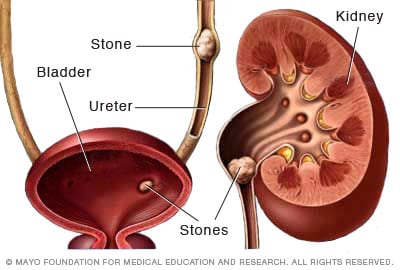Kidney stones are a common occurrence in many adults today, especially in obese men. More often than not, most people do not know when they are dealing with a kidney stone-related problem.
Kidney stones are hard collections of salt and mineral that are usually made up of calcium or uric acid. They are created in the kidney and can travel to other parts of the urinary tract. They usually vary in size and the smaller ones rarely cause any problems except they move into the ureter. The larger ones, however, tend to be very painful and rarely pass out without treatment. Here are some signs that might mean you’re dealing with kidney stones.
Pain: Back, Belly or Side
Kidney stone pains are very severe and account for over a million visits to the emergency room every year according to statistics. The pain—also known as renal colic—is caused when a stone moves into the narrow ureter. This causes a blockage that builds pressure in the kidney. The pain comes in waves and changes location and intensity as the stone moves. Usually, the back, belly or side suffer the most side effects.
Painful Urination
Pain during urination comes when the stone reaches the junction between the ureter and the bladder. Most times it can be mistaken for an infection and although kidney stones sometimes come with kidney stones, it is advised to check for stones first.
Urgent Need To Pee
The constant need to use the bathroom urgently and frequently could be another indicator of kidney stones. This means that the stone has moved to the lower part of the urinary tract and you might find yourself running to the bathroom at odd times. This sign also mimics a urinary tract infection and needs to be dealt with swiftly by a doctor.
Blood In The Urine
This is a common indicator for kidney stones and is clinically known as haematuria. Haematuria occurs when the stones damage the walls of the urinary tract—particularly the ureter. The blood can be red, pink or brown and sometimes even too small to see with the naked eye. However, it is always very painful and a doctor’s immediate attention is advised.

No comments:
Post a Comment